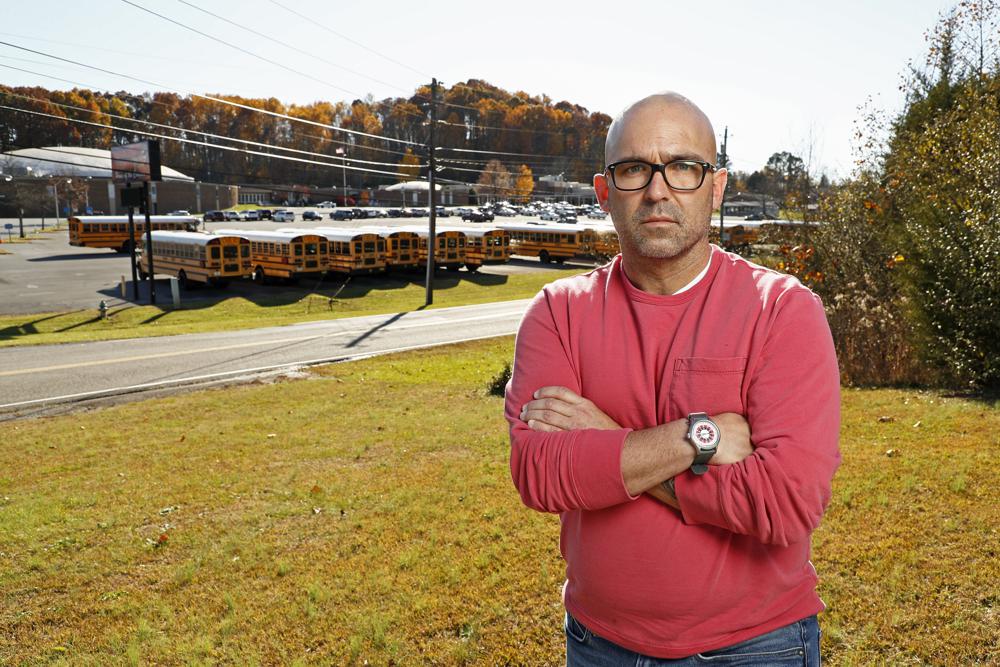Report: Alabama teacher’s union gave millions to many GOP lawmakers

A recent report by the conservative Alabama Policy Institute says Republican state lawmakers have received millions of dollars in contributions from the state teacher’s union despite a party ban. According to the report, the Alabama Education Association was the most significant contributor to GOP candidates in the last election cycle. The report says the teachers’ union gave House members in the 2022-23 reporting period $875,000 in direct contributions and senators $682,500. The teachers’ union has given more than $2.4 million to 85 of the 105 members of the GOP-majority House over their careers. The Alabama House has 76 GOP members, along with 27 Democrats, and only 18 Republican representatives declined union contributions. According to the report, only seven state senators have passed on union cash, while over their careers, the rest took in $1.51 million. The state has 27 GOP senators and eight Democrats. While many lawmakers were happy to receive campaign cash from the teachers’ union, most statewide officials, including Gov. Kay Ivey, didn’t partake. Some notable exceptions included three members of the state Board of Education – Tracie West, Yvette Richardson, Tonya Chestnut, and Wayne Reynolds – and Lt. Gov. Will Ainsworth, a Republican who received $60,000 of the $195,000 given to statewide officials over the course of their electoral careers. Download PDF Republished with the permission of The Center Square.
Steve Flowers: Board of Education

School board members are some of the most selfless public servants in Alabama. This accolade goes to the Alabama State Board of Education, and, more specifically, local school board members. These members are tasked with a very important mission but receive very little compensation for their time and efforts. They are indeed public servants. The Alabama State Board of Education is a nine-member body that sets public education policy for K-12 schools. The governor is an ex-officio member of the board, and the remaining eight members are elected to four-year terms from single-member districts of approximately equal population. There is no limit to the number of terms a school board member may serve. The seats are partisan-driven. Currently, our state school board has six Republican members and two Democratic members. Given the fact that members are elected rather than appointed, it is somewhat surprising that our current eight members are so well-qualified and suited to be state school board members. Dr. Wayne Reynolds, who represents District 8, best exemplifies this statement. He has a doctorate in education and has spent over four decades as an education administrator. He is retired and brings his experience and wisdom to the table. In his early years, Wayne was a decorated Vietnam War Veteran. He and his wife Carol reside in the Limestone/Madison area. Wayne is a Republican and was re-elected to his second four-year term earlier this year. Marie Manning has just been elected to District 6, which is a Republican district. She will begin her first term in January. Prior to her recent election to the state school board, Marie served as Vice President of the St. Clair County Board of Education. During her stellar career in education, Marie was a classroom teacher, vice-principal, principal, and superintendent. Dr. Yvette Richardson represents District 4 and is a resident of Montgomery. Yvette is a Democrat and was re-elected to another four-year term in the Democratic Primary. She has a doctorate degree from the University of Alabama and has had a distinguished career in education. Tracie West is a Republican member of the board from District 2. She was re-elected to a second four-year term in the Republican Primary. She hails from Auburn and, as would be expected from this area, is well-qualified and versed in education knowledge and policy. Prior to being elected to the state school board, Tracie served as a member of the Auburn City Schools Board of Education, including serving as president of that board. There are four members up for re-election in 2024, Jackie Ziegler, Stephanie Bell, Tonya Chestnut, and Belinda McRae, provided all four decide to seek another term. Jackie Ziegler of Mobile is a Republican board member and represents District 1. She was first elected in 2016 and is an experienced and successful educator. She is a graduate of the University of South Alabama. She was a classroom teacher, then a longtime principal in the Mobile County School System. She is married to State Auditor Jim Ziegler. Stephanie Bell, who represents District 3, is by far the most veteran member of the board, having first been elected in 1994 and re-elected to eight consecutive terms. At the end of her current term, she will have served over 30 years. She is a stellar member, an asset to the board, and hopefully, will run again. Stephanie is a lifelong resident of Montgomery, as is her husband. Dr. Tonya Chestnut, a native of Selma, is a Democrat and represents District 5. She has a doctorate in education and is the former Dean of Alabama State University College of Visual and Performing Arts. Belinda McRae of Hamilton is the Republican board member for District 7. She is in her first term. Belinda taught English and art for 25 years in the Marion County School System and served on the Marion County Board of Education before being elected to the State School Board. Choosing the State Superintendent is probably the most important task of the Alabama State School Board, and the board made an excellent choice when they selected Dr. Eric Mackey as Alabama State Superintendent of Education. Dr. Mackey is a former school superintendent and former Executive Director of the State School Superintendents Association. Most of our former governors did not take their ex-officio role as seriously as Governor Kay Ivey. Governor Ivey has been a very active and dutiful member of the Alabama State School Board. In closing, allow me to not only give accolades to the state school board but also a tip of the hat to all local school board members. See you next week. Steve Flowers is Alabama’s leading political columnist. His weekly column appears in over 60 Alabama newspapers. He served 16 years in the state legislature. Steve may be reached at www.steveflowers.us.
New laws steer some teachers away from race-related topics

New measures that restrict how race is addressed in classrooms have spread confusion and anxiety among many educators, who, in some cases, have begun pulling books and canceling lessons for fear of being penalized. Education officials have nixed a contemporary issues class in a Tennessee district, removed Frederick Douglass’ autobiography from reading lists in an Oklahoma school system, and, in one Texas case, advised teachers to present “opposing” views of the Holocaust. At least a dozen states have passed measures this year restricting how schools teach about racism, sexism, and other topics. While educators are still waiting to see how they will be enforced, the vagueness of some of the measures, coupled with stiff penalties, including the potential loss of teaching licenses, already are chilling conversations on race in schools and, in some cases, having consequences that likely go well beyond the intent of those approving the measures. Matt Hawn, a high school social studies teacher in Tennessee, said he has heard from teachers concerned about how they will teach controversial topics since he was fired himself this spring as state lawmakers were finalizing new teaching restrictions. “It’s certainly giving them caution, like, ‘What’s going to happen if I teach this?’ — because the penalty is so steep,’” Hawn said. Hawn was dismissed after school officials said he used materials with offensive language and failed to provide a conservative viewpoint during discussions of white privilege in his contemporary issues class, which has since been eliminated. Teaching around race and diversity has been on the rise alongside a broader acknowledgment that racial injustice didn’t end in America with the passage of the 1964 Civil Rights Act. Those efforts have spurred a backlash, particularly among Republican voters. In Virginia, Republican Glenn Youngkin won the governor’s race this month promising to ban critical race theory, a term has become a stand-in for concepts like systemic racism and implicit bias. His Democratic opponent faced criticism for saying parents shouldn’t tell schools what to teach. Some sections of the new laws would seem unobjectionable. Tennessee’s law bars the teaching that one race or sex is inherently superior to another race or sex. But other sections are murkier, barring teaching that promotes division or causes children to feel psychological distress because of their race or sex. Those vague prohibitions have left teachers worried that any instruction on difficult topics like slavery or contemporary racism could be construed by parents as violating the law, said Alice O’Brien, general counsel for the National Education Association. “These measures are problematic because it is unclear what they mean and very much in the eye of the beholder,” O’Brien said. “I think it is worth understanding that every state already has pretty comprehensive rules in place for K-12 about what teachers have to teach. And they’re required to teach the whole history of the United States … not just the parts that we can feel celebratory about.” Some have cited the new laws in pushing to eliminate instructional material. In Tennessee, a conservative group of mothers in the Nashville suburb of Williamson County, Moms for Liberty, has challenged how schools teach the civil rights movement to second graders. In a letter to the Department of Education, Robin Steenman complained that the texts and accompanying teachers manual imply that “people of color continue to be oppressed by an oppressive ‘angry, vicious, scary, mean, loud, violent, (rude), and (hateful)’ white population.” The books Steenman cited include “Ruby Bridges Goes to School” and “Martin Luther King Jr. and the March on Washington.” In Oklahoma, teachers in the Edmond Public Schools said books by authors of color were struck from a list of anchor texts around which English teachers build their curriculum. A lawsuit filed by teachers, students, and parents said the district also removed commonly taught texts by Black authors from the curriculum, including the autobiography of Frederick Douglass. A spokesperson for the school system, Susan Parks-Schlepp, said some reading assignments were made optional as part of an annual review to ensure they align with state guidelines. In Texas, one Republican lawmaker directed a committee he chairs to seek information on the use of at least 850 books on topics ranging from racism to abortion. State Rep. Matt Krause, who is running for state attorney general, said five Texas school districts had removed books “after receiving objections from students, parents, and taxpayers.” Two of the districts confirmed that they had received copies of the letter and were looking into the matter, but they did not comment further. Clay Robinson, a spokesperson for the Texas State Teachers Association, said the letter only adds to the confusion teachers have dealt with since the state passed a bill requiring educators to teach “both sides” of topics. “Teachers are already feeling like Big Brother is looking over their shoulders,” Robinson said. The racial divide in support for these measures was obvious at an Alabama School Board meeting in August where the two Black members voted against a resolution denouncing “instruction intended to indoctrinate students” in ideologies promoting a particular race or sex, while the seven white members voted in favor. Speaking against the measure, school board member Tonya Chestnut said all children deserve to be in an environment where they feel safe and can appreciate their heritage, but the resolution could “put teachers in a position where they feel uncomfortable, even fearful, to teach the truth.” James Copland, director of legal policy at the conservative Manhattan Institute, said that chilling effects are real, but that appropriately tailored new laws are needed to show schools what is and isn’t appropriate. He pointed to some episodes including a Cupertino, California, teacher who directed elementary school students to “deconstruct” their racial identities, and a Philadelphia elementary school that had students appear on an auditorium stage with signs that read “Jail Trump” and “Black Power Matters.” “We don’t want to chill genuine discussion and clear-minded study of history,” Copland said. But he said students should not be forced to subscribe to a set of
Schools not teaching race theory, some want to ban it anyway

Alabama might ban the so-called “critical race theory” from being taught in public K-12 schools even though education officials said no schools are actually doing so. Members of the Alabama Board of Education on Tuesday discussed the wording of a possible resolution that could be voted on later this summer. A Republican lawmaker has introduced legislation for the 2022 session to ban the teaching of critical race theory. Some GOP-controlled states have already passed such bans this year as a national debate intensifies about how race should be used as a lens in classrooms to examine the country’s tumultuous history. Critical race theory is a way of thinking about America’s history through the lens of racism, but it is not typically taught in public schools. State Superintendent Eric Mackey said state school board members want to deal with the issue but said critical race theory is “certainly not” taught in schools now. “Critical race theory as it exists is a graduate-level concept. But it is not taught anywhere in any of our courses of study,” Mackey told board members Tuesday. One draft of the state school board resolution would say that the board believes the U.S. is not inherently racist country, and the state of Alabama is not “inherently racist.” “I can’t with a clear conscience say that that’s actually true,” board member Tonya Chestnut said Tuesday. “Theoretically I would like to say that Alabama is not a racist state but I’ve experienced it,” said Chestnut, who is Black. Board member Stephanie Bell expressed concern that the resolution did not go far enough. “We need to deal with it in a way that actually does something instead of taking a stand so that it looks like we’ve done something,” Bell said. Mackey said they will continue to work on the wording and may vote as soon as next month. The superintendent said they don’t want to infringe on teachers’ ability to talk to students about important, and even controversial, issues provided they don’t “push children to one side or the other.” The American Civil Liberties Union of Alabama last week sent school board members a letter in opposition to the resolution. “Instead of preserving intellectual freedom, this resolution is a blatant attempt to suppress and censor speech,” wrote JaTaune Bosby, executive director of the ACLU of Alabama. “While states generally have latitude to determine school curricula, this effort to ban conversations about race would effectively gag educators and students, preventing both from teaching and learning effectively.” Gov. Kay Ivey, who serves as president of the board, said, “Our goal is to have all of our students treated based on their individual ability, not on being part of a certain group, sex race, or anything else,” Ivey said. Republished with the permission of the Associated Press.


